
We have now reach my top ten favorite films of all time. While films like "Strangers On A Train" and "Fargo" are immensely entertaining and capture a lot of the greatness of cinema, these ten films are not only some of my favorites, but are also the greatest films I have ever seen. I've gone over my 25 favorite films for months now, attempting to work out the proper order. But as many times as I've gone through the previous fifteen films, the top ten have always remained the same. These are the movies that I love more than any other.
Not to mention, there is an enormous range in the top ten, with films being as old as 1931 and as young as 2008, with no one genre repeating. Every film is wholly unique as the last one and capture the imagination and scope of cinema.
Let's start my top ten favorite films with...
I've often pondered about what I would consider the greatest film of all time. Not just what my favorite film is, but the single greatest achievement in filmmaking. A film that defines the power of cinema, and anyone could see to understand what a film can accomplish.
While obvious choices such as "Citizen Kane," "Vertigo" and "2001: A Space Odyssey" are certainly up near the top of that list, I do have my grievances with them, in particular with "Citizen Kane" and "Vertigo," to the point that I do not consider "Vertigo" Hitchcock's best work. Of course, the matter of the greatest film of all time is entirely subjective, like all film criticism, but there is one film I jump to when it comes to capturing a multitude of emotions and storytelling when it comes to cinema.
For me, the greatest film of all time is Billy Wilder's "Sunset Boulevard." This is a movie that understands the strengths and weaknesses of cinema, by showing the lives that are created and then destroyed by the weight celluloid carries. Film is not only examined, but judged for how cruel yet necessary it is for people. From both in front of and behind the camera, cinema is shown as a self-destructive art form with beautiful yet dangerous consequences.
Joe Gillis (William Holden) is a Hollywood screenwriter that hasn't had a successful script in months and probably hasn't eaten a decent meal longer than that. When the feds come to take away his car, which he is several payments behind on, Gillis runs as far as he can, and pulls into a mansion that appears to be abandoned. But as he observes the decaying ruins, he finds the house has two occupants, including the once famous silent movie star, Norma Desmond (Gloria Swanson) and her butler, Max (Erich Von Stroheim).
It turns out that Ms. Desmond is wealthy beyond reason, but has nothing to use her fortune on. She refuses to go out into the world, possibly afraid of how far it has come since the silent era of filmmaking. Norma promises to make a return to cinema though, because she has spent years writing a screenplay big enough to fit six movies to use as her magnum opus and let the world know that Norma Desmond is greatest actress, without saying a word.
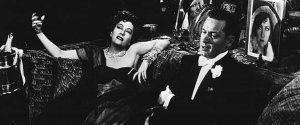
Part of the reason I consider "Sunset Boulevard" the greatest film is because of how close it resembles real life. As I said back in my look at "Singin' In The Rain," the end of the silent era is the most interesting era in filmmaking. While the Gene Kelly musical covered the topic in a positive and optimistic light, "Sunset Boulevard" is far more brutally honest - the beginning of talkies destroyed many careers and lives.
Gloria Swanson, who plays our aging silent star of a time long since passed, was a popular silent movie actress, and we see some of her silent roles in "Sunset Boulevard," also directed by her butler, Erich Von Stroheim in "Queen Kelly," "The Merry Widow" and the now famous "Greed." But once sound came around, Swanson disappeared and Von Strohiem pursued more of an acting career.
Now Swanson plays a star that has lost its shine, but does not see that as her fault. It isn't that she got bad at acting, but cinema became too much. The now famous quote, "I am big, it's the pictures that got small," being the key example of that.
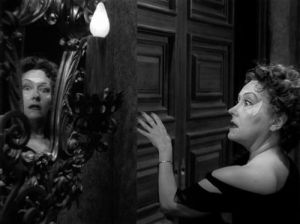
"There once was a time in this business when I had the eyes of the whole world," says Desmond. "But that wasn't good enough for them, oh no! They had to have the ears of the whole world too. So they opened their big mouths and out came talk."
All Desmond does is sit in exile in a mansion that is falling apart, screening only movies of herself, planning a comeback that will never come. She claims the world still loves her, but that she has merely been forgotten.
This cuts even deeper when it comes to Erich Von Stroheim, who had an extremely promising career in the silent era, both in Germany and Hollywood. Max even points this out in the film, saying in the early 1920s, the most promising directors were D.W. Griffith, Cecil B. DeMille and himself, which was true. But after talkies were invented, Von Stroheim directed two sound films, both of which were poorly received, leading to the once very skilful director taking up acting roles where he essentially amounted to the token Nazi in American films during WWII.
Now Von Stroheim plays Max, a man who is just as obsessed with the past as Ms. Desmond is. The difference with Max is he felt life was at its best when he worked together with Norma, which might explain why Max was her first husband. But after attempting to break into film again, he realized his place was with Norma, and became her servant - forever loyal to her word and protecting her from the world that has long since passed her by, fiercely devoted to the greatness of Norma Desmond.
The point of "Sunset Boulevard" is made clear - the world of film is harsh and forever evolving.
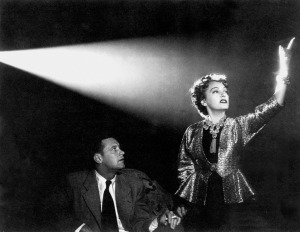
Filmmakers and audiences focus on the here-and-now, and rarely remember where it all came from. We discard the stars of the past at our leisure and have no regard for what that does to them. To many of these stars, cinema was their life, they cannot live without celluloid in their veins.
The relationship between Norma and Max is what makes "Sunset Boulevard" such an emotional piece. On her own, Norma's performance is over the top, near the point of parody. Her exaggerated gestures, wild movements and sneers make her seem like she is on the edge of madness throughout the film. But Max remains loyal and calm, because he sees more in her than just an aging movie star. He understands the restraint, courage and talent Norma has. Because he is dedicated to loving her, both the audience and Joe Gillis can find something to love about Norma as well.
"Sunset Boulevard" blurs that line between reality and fiction better than any other film I have seen. Real names of actors, like Tyronn Power, Bing Crosby and Alan Ladd, are used many times, famous silent stars like Buster Keaton are shown hanging out with Norma Desmond (nicknamed "the waxworks" by Gillis), and when Desmond visits Cecil B. DeMille on the Paramount studio set, DeMille is making an actual movie, "Samson And Delilah."
"Sunset Boulevard" understands the illusion of cinema and knows where reality begins, but to Norma Desmond there is no difference. She is obsessed with her star power and the movies she has created that she is blind to the world around her. Movie? Real life? To her, what's the difference?
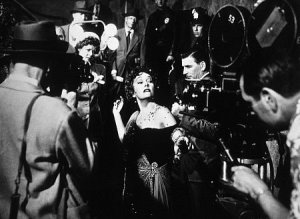
To top it all off, "Sunset Boulevard" might have some of the greatest dialogue in any piece of cinema. Nearly every line in the film is quotable for one reason or another, whether it is Norma's constant need to back talk how much cinema has changed, such as, "We didn't need dialogue. We had faces."
There was also Joe Gillis' constant voice over narration, which described in great detail how the mansion was falling apart and how sad Norma's condition was, pointing out there is nothing wrong with being 50, unless you try to acting like you're still 25.
"Poor devil," says Gillis. "Still waving proudly to a parade which had long since passed her by."
Of course, there is the closing line of the film from Norma as her whole life crumbles in front of her, but she has now becomes so enamored with the past that she is oblivious to the fact that she is about to go to jail. Like most Billy Wilder films, the closing line is one of the best lines in the film.
"I promise you I'll never desert you again," says Desmond. "You see, this is my life. It always will be. Nothing else. Just us, the cameras, and those wonderful people out there in the dark. All right, Mr. DeMille, I'm ready for my close-up."
To me, "Sunset Boulevard" respects cinema more than any other film I have seen. It understands the power it has over people and the type of art it can provide, but also that movies can just as easily destroy the lives it builds up. That cinema is intoxicating and people will do anything to get back the star power they once had. "Sunset Boulevard" cuts so close to life that it forces you to take a step back and fully appreciate the level of detail Billy Wilder put into understanding just how far cinema has come.
It is not only one of my favorite films, but also my pick for the greatest film of all time. So why "Sunset Boulevard" only number ten on this list? Well, like I said in the beginning, this is a countdown of my favorite movies, and while I adore this film to death, there are some other films I love more than this classic film noir.
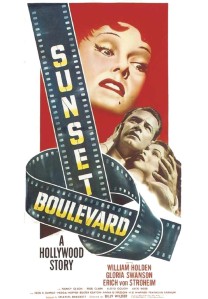

1 comment:
Sunset is great, but Vertigo still rocks!
Post a Comment